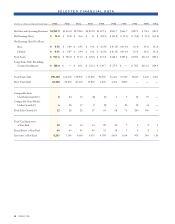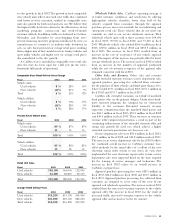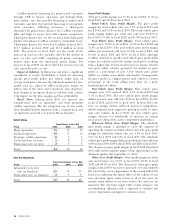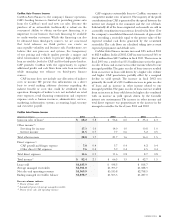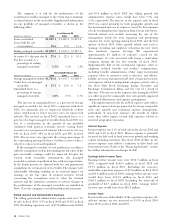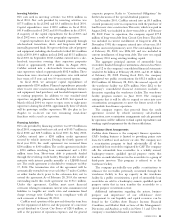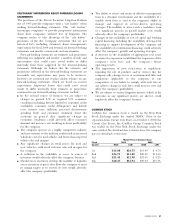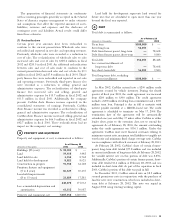CarMax 2003 Annual Report Download - page 27
Download and view the complete annual report
Please find page 27 of the 2003 CarMax annual report below. You can navigate through the pages in the report by either clicking on the pages listed below, or by using the keyword search tool below to find specific information within the annual report.
CARMAX 2003 25
Investing Activities
Net cash used in investing activities was $80.4 million in
fiscal 2003. Net cash provided by investing activities was
$57.5 million in fiscal 2002 and $3.3 million in fiscal 2001.
Capital expenditures were $122.0 million in fiscal 2003,
$41.4 million in fiscal 2002 and $10.8 million in fiscal 2001.
A majority of the capital expenditures for fiscal 2003 and
fiscal 2002 were a result of our geographic expansion.
Capital expenditures have been funded primarily through
sale-leaseback transactions, short- and long-term debt and
internally generated funds. Net proceeds from sales of property
and equipment, including sale-leasebacks totaled $41.6 million
in fiscal 2003, $99.0 million in fiscal 2002 and $15.5 million in
fiscal 2001. In September 2002, CarMax entered into a sale-
leaseback transaction covering three superstore properties
valued at approximately $37.6 million. In August 2001,
CarMax entered into a sale-leaseback transaction covering
nine superstores valued at approximately $102.4 million.These
transactions were structured at competitive rates with initial
lease terms of 15 years and two 10-year renewal options.
In fiscal 2004, we anticipate capital expenditures of
approximately $200 million. Planned expenditures primarily
relate to new store construction, including furniture, fixtures
and equipment; land purchases; and leasehold improvements
to existing properties. In addition to one standard-sized
superstore originally planned in fiscal 2003 but opened in
March of fiscal 2004, we expect to open seven or eight more
superstores during fiscal 2004, approximately three of which
will be prototype satellite superstores. We also plan in Los
Angeles to co-locate our two remaining stand-alone
franchises with a used car superstore.
Financing Activities
Net cash provided by financing activities was $39.8 million in
fiscal 2003, compared with net cash used of $105.7 million in
fiscal 2002 and $22.5 million in fiscal 2001. In May 2002,
CarMax entered into a $200 million credit agreement
secured by vehicle inventory. During the fourth quarter of
fiscal year 2003, the credit agreement was increased from
$200 million to $300 million.The credit agreement includes
a $200 million revolving loan commitment and a $100
million term loan. Short-term debt is primarily funded
through the revolving credit facility. Principal is due in full at
maturity with interest payable monthly at a LIBOR-based
rate.The credit agreement is scheduled to terminate on May
17, 2004. The termination date of the agreement will be
automatically extended one year each May 17 unless CarMax
or either lender elects, prior to the extension date, not to
extend the agreement. As of February 28, 2003, the amount
outstanding under this credit agreement was $156.1 million.
Under this agreement, CarMax must meet financial
covenants relating to minimum current ratio, maximum total
liabilities to tangible net worth ratio and minimum fixed
charge coverage ratio. CarMax was in compliance with all
such covenants at February 28, 2003.
CarMax used a portion of the proceeds from the term loan
for the repayment of debt to and the payment of a one-time
special dividend to Circuit City Stores of $28.4 million, as
well as the payment of separation expenses, and for general
corporate purposes. Refer to “Contractual Obligations” for
further discussion of the special dividend payment.
In December 2001, CarMax entered into an $8.5 million
secured promissory note in conjunction with the purchase of
land for new store construction.This note, which was paid in
August 2002, was included in short-term debt as of February
28, 2002. Prior to separation, the company repaid $77.8
million of long-term debt from Circuit City Stores.This debt
was included in current installments of long-term debt. In
November 1998, the company entered into a four-year, $5.0
million unsecured promissory note.The outstanding balance
at February 28, 2002, was $826,000 and was included in
current installments of long-term debt. The note was repaid
in January 2003 using existing working capital.
The aggregate principal amount of automobile loan
receivables funded through securitizations discussed in Notes
11 and 12 to the company’s consolidated financial statements
totaled $1.86 billion at February 28, 2003, and $1.49 billion
at February 28, 2002. During fiscal 2003, the company
completed two public securitizations for $512.6 million and
$500 million. At February 28, 2003, the unused capacity of
the warehouse facility was $276 million. Note 2(C) to the
company’s consolidated financial statements includes a
discussion regarding the warehouse facility. The warehouse
facility program matures in June 2003. The company
anticipates that it will be able to expand or enter into new
securitization arrangements to meet the future needs of the
automobile loan finance operation.
The company expects that proceeds from the credit
agreement secured by vehicle inventory, sale-leaseback
transactions, new securitization arrangements and cash generated
by operations will be sufficient to fund capital expenditures and
working capital requirements for the foreseeable future.
Off-Balance Sheet Arrangements
CarMax Auto Finance is the company’s finance operation.
CAF’s lending business is limited to providing prime auto
loans for CarMax’s used and new car sales.The company uses
a securitization program to fund substantially all of the
automobile loan receivables originated by CAF. The company
sells the automobile loan receivables to a wholly owned,
bankruptcy-remote, qualified special purpose entity that
transfers an undivided interest in the receivables to a group of
third-party investors. This program is referred to as the
warehouse facility.
The company periodically uses public securitizations to
refinance the receivables previously securitized through the
warehouse facility to free up capacity in the warehouse
facility. In a public securitization, a pool of automobile loan
receivables are sold to a bankruptcy-remote, qualified special
purpose entity that in turn transfers the receivables to a
special purpose securitization trust.
Additional information regarding the nature, business
purpose and importance of our off-balance sheet
arrangement to our liquidity and capital resources can be
found in the CarMax Auto Finance Income, Financial
Condition, and Market Risk sections of this Management’s
Discussion and Analysis, as well as in Notes 11 and 12 to the
company’s consolidated financial statements.



